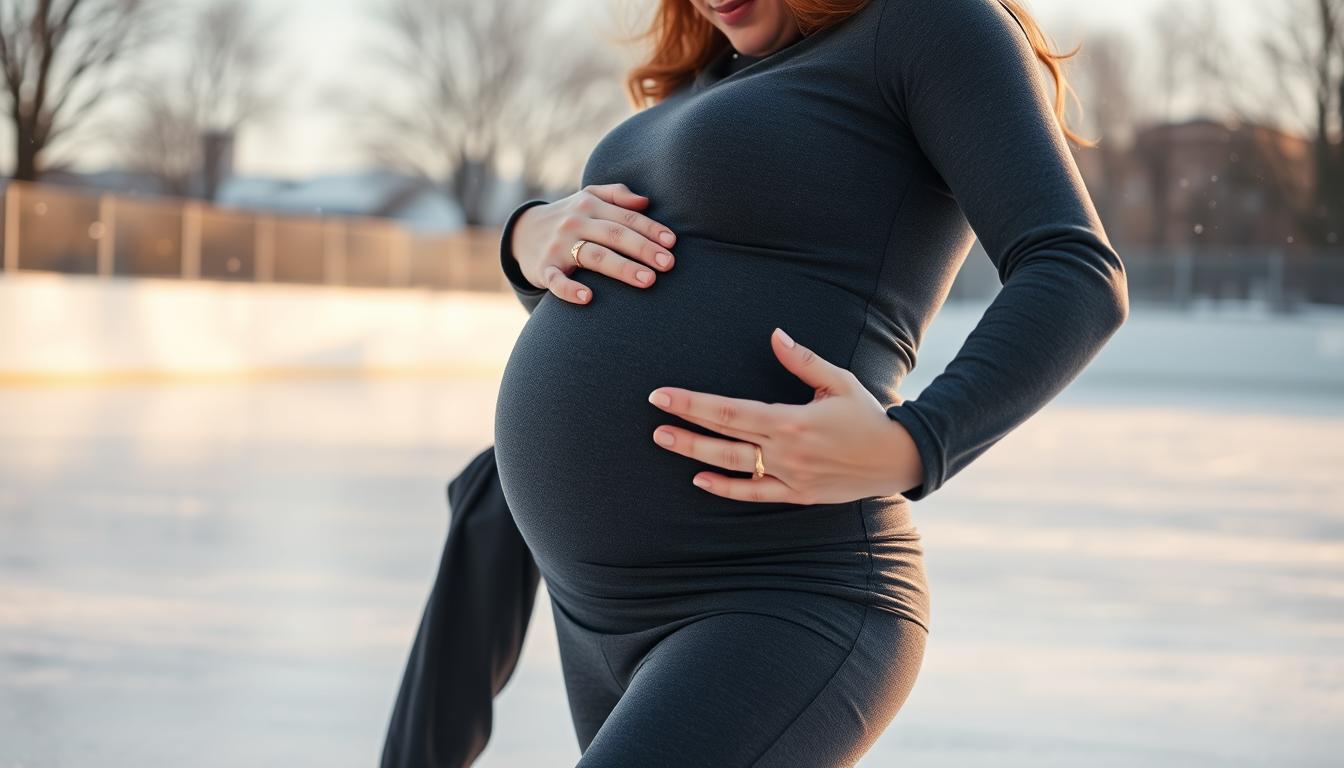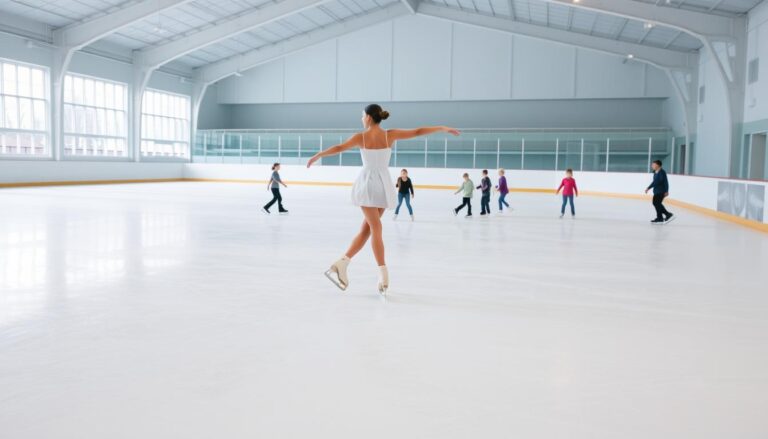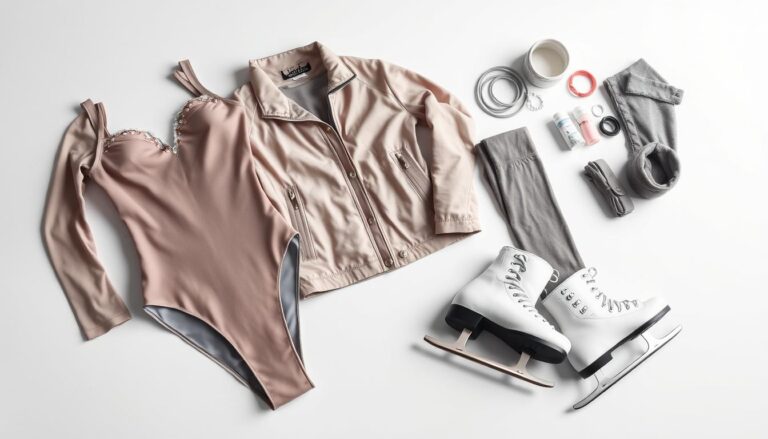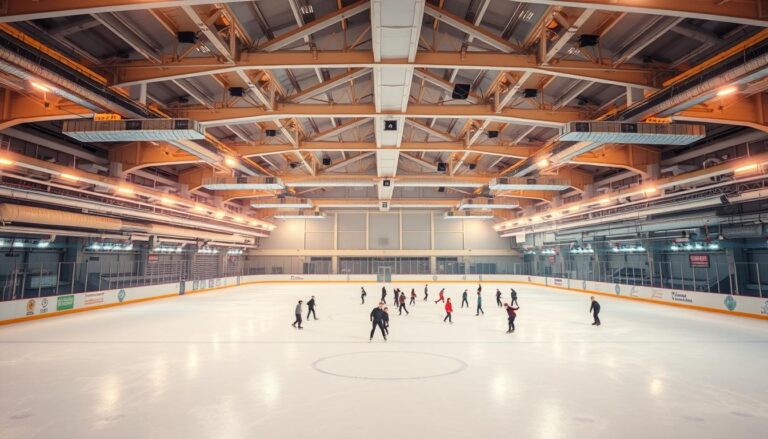Pregnant? Here’s What to Know About Ice Skating
Pregnancy doesn’t mean you must hang up your ice skates forever. Knowing about ice skating and pregnancy helps expectant mothers stay active. This is a special time.
Can you go ice skating while pregnant? It’s not a simple yes or no. Each pregnancy is different. Many factors decide if ice skating is safe for you and your baby.
Ice skating during pregnancy needs careful thought. Your body changes a lot, affecting your skating ability. This includes balance and safety.
Doctors suggest exercise plans tailored to each pregnancy. Some women can skate safely with precautions. Others might prefer low-impact sports.
This guide will cover ice skating and pregnancy. You’ll learn from experts, get safety tips, and find practical advice. This helps you choose the best for your health and baby’s well-being.
Whether you’re experienced or just starting, knowing ice skating’s risks and benefits is key. We’ll discuss balance, safety gear, and more. This information is vital.
Get ready to explore pregnancy and ice skating confidently. Your journey to safe physical activity begins here. It’s an exciting time.
Understanding Ice Skating During Pregnancy: A Complete Guide
Pregnancy changes your body in amazing ways, including how you do physical activities like ice skating. Knowing the safety tips for ice skating during pregnancy is key. This guide will help you understand the risks of ice skating while pregnant safely.
Your body changes a lot during pregnancy. Each trimester brings new challenges and things to think about for staying safe while being active.
Physical Changes That Affect Balance
Pregnancy changes your center of gravity, making balance important for ice skating. Your growing belly changes how you weigh, affecting your balance on the ice.
- Increased weight in front of body
- Shifted center of gravity
- Reduced core muscle strength
- Potential balance disruptions
Core Body Temperature Considerations
Keeping your body temperature safe is key during pregnancy. Ice skating can make it hard to keep your body warm enough.
| Temperature Factor | Pregnancy Consideration |
|---|---|
| Rink Temperature | Typically 50-60°F |
| Recommended Body Temp | Keep under 102.2°F |
| Optimal Skating Duration | 15-30 minutes |
Impact on Joint Stability
Pregnancy hormones like relaxin make your joints more flexible. Your ligaments become more elastic, so you need to be careful to avoid injuries.
Knowing about these changes helps you make smart choices about ice skating during pregnancy. Always talk to your healthcare provider before starting any athletic activities.
Can You Go Ice Skating While Pregnant?
Deciding on physical activity during pregnancy is tricky. Ice skating is no exception. Your safety depends on your health, skating skills, and how far along you are.
Doctors usually take a careful view of exercise during pregnancy. If you’re an experienced skater, you might skate lightly in early pregnancy. But, you must be very careful.
- Assess your current skating skill level
- Consult with your healthcare provider
- Listen to your body’s signals
- Prioritize balance and gentle movements
Several things affect your ability to ice skate while pregnant:
- Pregnancy trimester
- Personal skating proficiency
- Overall physical condition
- Risk of falling
Beginners should not ice skate when pregnant. Experienced skaters can, but with great caution. It’s important to know your limits and risks.
Your safety and your baby’s health are the most important things. Always think carefully about exercise during pregnancy and get medical advice.
The First Trimester: What Experts Say About Ice Skating
When you’re pregnant, it’s important to think about exercise carefully. Ice skating is one activity to consider. Your body changes a lot in the first 12 weeks, so knowing the risks and benefits is key.
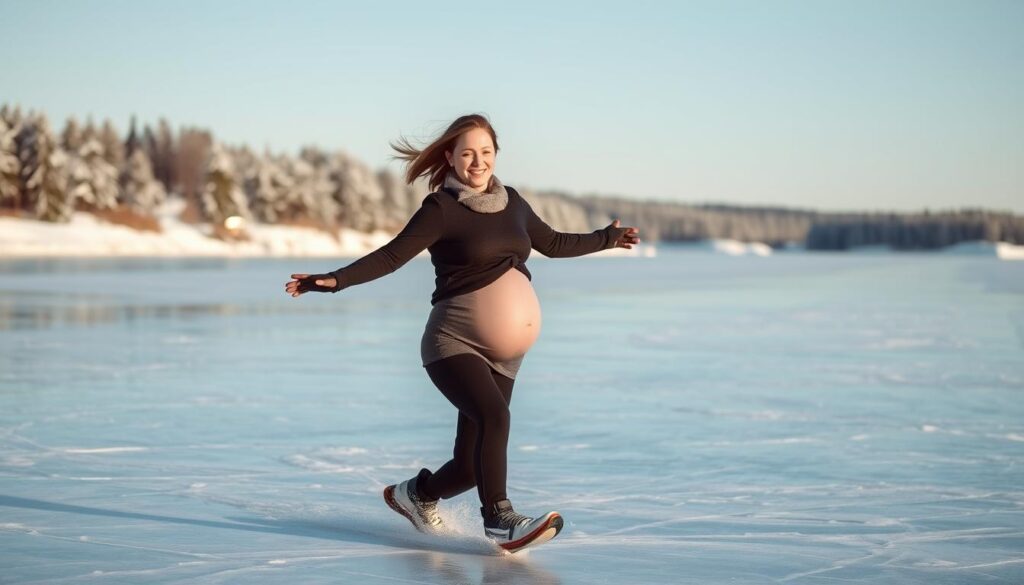
Doctors give advice for pregnant women who want to stay active. They say to be careful in the early stages, but don’t stop moving completely.
Early Pregnancy Safety Guidelines
Even if you’re an experienced skater, listen to the experts. Important safety tips include:
- Make sure you’re good at balancing and skating before you get pregnant
- Talk to your doctor before you start skating again
- Avoid tricky skating moves that could make you fall
- Stop skating right away if you feel any pain
Risk Assessment During Weeks 1-12
In the first trimester, your body goes through big changes. These changes can affect your balance and stability. It’s important to think about your own risks when choosing prenatal fitness activities.
Some risks to watch out for are:
- Less stable core
- More flexible joints
- Greater chance of losing your balance
- Possible effects on your baby’s early development
Medical Recommendations
Doctors recommend a plan that’s just right for you. Not all skating experiences are the same. If you’re a pro or have lots of experience, you might get different advice than a beginner.
Here’s what doctors say:
- Always wear protective gear
- Skate slowly and carefully
- Drink plenty of water and don’t overdo it
- Stop skating if you notice anything strange
Safety Precautions for Pregnant Skaters
Ice skating while pregnant needs extra care. It’s important to know safety tips to protect both you and your baby. Before you skate, learn about pregnancy exercise safety to avoid risks.
Skating during pregnancy requires careful planning. Your body changes a lot, affecting your balance and stability on the ice.
- Consult your healthcare provider before skating
- Wear supportive, well-fitted protective gear
- Choose less crowded skating times
- Skate with a supportive partner or companion
- Listen to your body and stop when feeling uncomfortable
Here are some key safety tips:
- Warm up thoroughly before skating
- Maintain slow, controlled movements
- Avoid complex skating techniques
- Stay hydrated and take frequent breaks
- Wear comfortable, layered clothing
Understanding your physical limits is key to safe skating. Reduced balance and increased joint flexibility make it harder. Always put safety first.
Pro tip: Tell the rink staff you’re pregnant. They can help make your skating safer.
Benefits of Staying Active During Pregnancy
Pregnancy is a special time to focus on your health. Prenatal fitness activities help you stay active. This isn’t just about keeping fit. It’s about taking care of you and your baby’s health.
Being active during pregnancy can make your experience better. It helps your body adapt to changes. It also prepares you for the challenges of being a mom.
Cardiovascular Health Advantages
Your heart works harder during pregnancy. Prenatal fitness activities can:
- Strengthen your heart
- Improve blood flow
- Lower the risk of gestational diabetes
- Keep blood pressure healthy
Mental Wellness Benefits
Exercise is good for your mind too. Movement releases endorphins that fight stress and anxiety. Regular activity can:
- Make you feel happier and less depressed
- Help you sleep better
- Boost your self-confidence
- Clear your mind
Weight Management
Keeping a healthy weight during pregnancy is important. Prenatal fitness activities help you:
- Manage weight gain
- Build muscle
- Boost metabolism
- Recover faster after giving birth
Every pregnancy is different. Always talk to your doctor before starting any exercise. This ensures it’s safe and right for you.
When to Avoid Ice Skating During Pregnancy
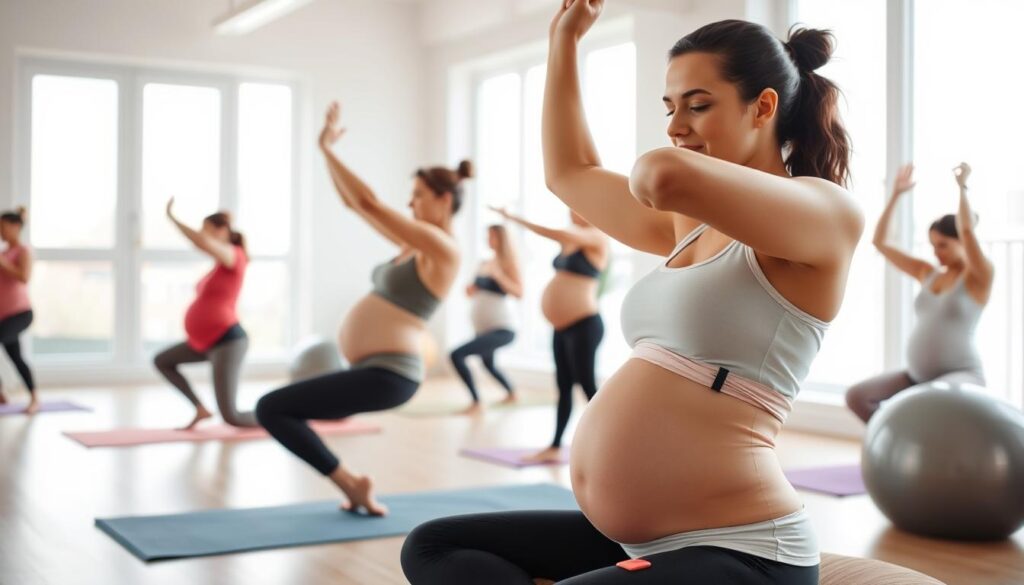
Pregnancy can make some activities tricky, like ice skating. It’s important to know the risks to keep you and your baby safe. Some situations mean you should definitely not skate.
Doctors say to avoid ice skating at certain times and under certain health conditions. It’s key to think about falling or sudden movements when you’re pregnant.
- High-risk pregnancy conditions
- Placenta previa or other cervical complications
- History of premature labor
- Severe balance issues
- Recent pregnancy-related medical interventions
Here are times when you should stop skating:
- First trimester: When the embryo is most vulnerable
- Third trimester: When balance can be a big issue
- When you have unexplained spotting or cramping
- After your doctor tells you to stop
Your body is trying to tell you something. Pay attention to any discomfort or unusual feelings. Always talk to your doctor before starting or continuing any exercise while pregnant.
Getting advice from a healthcare professional is the best way to know if it’s safe to skate. Every pregnancy is different, and you need a doctor’s opinion to make sure you’re safe.
Essential Gear and Equipment for Pregnant Skaters
Getting ready for ice skating while pregnant means picking the right gear. This ensures you stay comfortable and safe while staying active.
Your body changes a lot during pregnancy. So, choosing the right gear is key for a safe skating time. Pregnant women need special gear that fits their changing body.
Selecting the Perfect Skates
Finding the right skates gets harder as your body changes. Keep these tips in mind:
- Choose skates with extra ankle support
- Opt for wider fitting options
- Select skates with adjustable closures
- Consider rental options for flexible sizing
Protective Wear Essentials
Wearing protective gear is vital for safety. Look for gear that protects well without getting in the way.
| Protective Item | Pregnancy Considerations |
|---|---|
| Helmet | Lightweight, adjustable fit |
| Knee Pads | Soft, flexible material |
| Wrist Guards | Expandable sizing |
Pro tip: Always check with your healthcare provider before skating during pregnancy.
Remember, staying comfortable and safe is most important. Your gear should support you without limiting your movement or putting too much pressure on your body.
Alternative Winter Activities for Pregnant Women
Pregnancy doesn’t mean you have to stay indoors all winter. You can stay active with safe prenatal fitness activities. This keeps you healthy and full of energy throughout your pregnancy.
Winter brings special chances for expecting moms to do gentle, low-impact exercises. These keep you fit while keeping both you and your baby safe. The goal is to pick activities that are low-risk and fun.
- Indoor Swimming: A great full-body workout that’s easy on your joints
- Prenatal Yoga Classes: Helps build strength and flexibility in a safe place
- Stationary Cycling: Offers heart health benefits without the risk of falls
- Walking on Treadmills: A controlled, safe way to exercise with adjustable intensity
If you love being outdoors, some winter activities can be safe for pregnant women with the right precautions:
- Light Snowshoeing on groomed trails
- Gentle Cross-Country Skiing
- Winter Nature Walks
Always talk to your healthcare provider before trying any new exercise during pregnancy. Every woman’s body is different. Getting advice from your doctor is key to exercising safely in winter.
Medical Guidelines for Exercise During Pregnancy
When you’re pregnant, it’s important to pay attention to your body’s needs. Being active during pregnancy has many health benefits. But, it’s key to know the right way to do it for your safety.
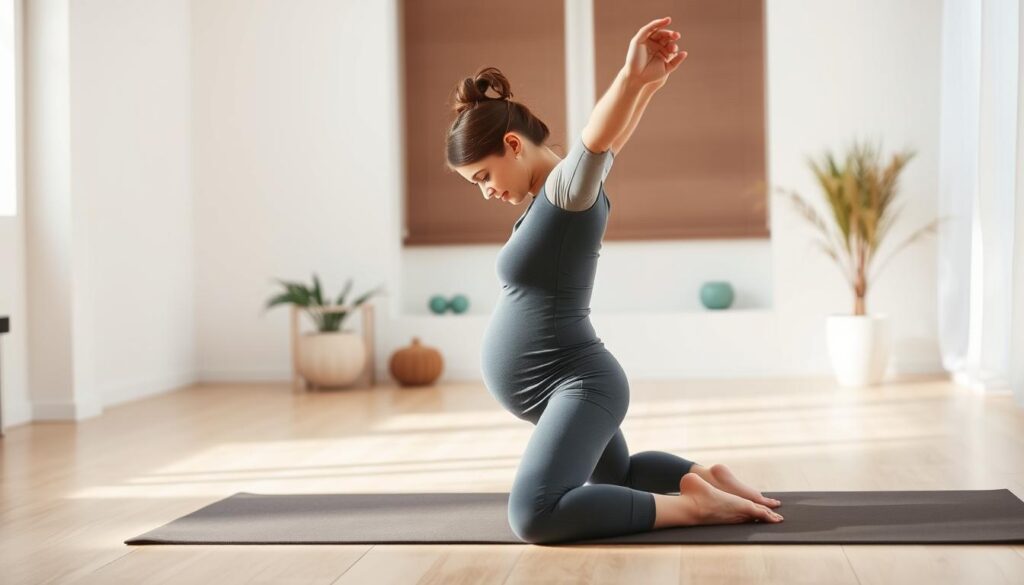
Doctors say to balance your exercise during pregnancy. Your workouts should keep you fit but also avoid risks.
Heart Rate Monitoring During Pregnancy
It’s vital to watch your heart rate when you exercise while pregnant. Here are some tips:
- Try to keep your heart rate under 140 beats per minute
- Use the talk test to check if you’re okay
- Wear a heart rate monitor for accurate tracking
| Pregnancy Stage | Recommended Exercise Intensity | Duration |
|---|---|---|
| First Trimester | Low to Moderate | 30 minutes, 3-4 times weekly |
| Second Trimester | Moderate | 30-45 minutes, 3-5 times weekly |
| Third Trimester | Low Intensity | 20-30 minutes, 2-3 times weekly |
Duration and Intensity Recommendations
Staying active during pregnancy does more than keep you fit. It can also boost your mood and ease pregnancy discomfort. Plus, it helps prepare your body for childbirth.
- Begin with low-impact exercises
- Listen to your body’s signs
- Check in with your healthcare provider often
- Drink plenty of water and don’t push too hard
Every pregnancy is different. What works for one woman might not be best for another. Always put your comfort and safety first when planning your exercise routine.
Signs to Stop Skating Immediately
Pregnancy means you need to listen to your body more than ever, even when you’re ice skating. Knowing the risks of skating while pregnant is key. You must recognize warning signs that mean you should stop right away.
Your health and your baby’s are the most important things. When you’re on the ice, staying balanced is a big deal. So, it’s vital to follow safety rules for exercising while pregnant.
- Sudden Dizziness or Loss of Balance: Immediate stop required
- Sharp Abdominal Pain or Cramping
- Unusual Vaginal Discharge
- Chest Discomfort or Breathing Difficulties
- Persistent Muscle Weakness
Doctors say it’s important to watch how your body reacts to winter sports. Some big warning signs include:
| Warning Sign | Recommended Action |
|---|---|
| Contractions | Stop immediately, contact healthcare provider |
| Severe Headache | Rest and seek medical evaluation |
| Significant Swelling | Consult with obstetrician |
Remember, your health is more important than any skating session. If you’re unsure, get off the ice and focus on your well-being.
Temperature Regulation and Pregnancy
When you’re pregnant, it’s important to keep an eye on your body temperature. Skating moms-to-be need to find ways to stay cool and safe while enjoying the sport.
Your body changes a lot during pregnancy, affecting how you handle heat and cold. These changes are due to hormonal shifts and more blood flowing through your body. Knowing about these changes helps you decide what physical activities are safe for you.
Avoiding Overheating
It’s risky to get too hot when you’re pregnant. Your body temperature should stay below 102.2°F to keep your baby safe. Look out for these signs that you might be overheating:
- Excessive sweating
- Dizziness or lightheadedness
- Rapid heartbeat
- Feeling unusually warm
Proper Layering Techniques
Staying cool while exercising during pregnancy means mastering layering. Choose clothes that breathe and wick away moisture to help control your body temperature.
- Base Layer: Lightweight, moisture-wicking material
- Middle Layer: Insulating but not too thick
- Outer Layer: Lightweight, windproof jacket
Pro tip: Choose layers you can adjust easily. This way, you can remove them if you start to feel too warm while skating.
Ice Rink Environment Considerations
When you’re pregnant and ice skating, safety is key. Choosing the right ice rink is important for your health and fun.
Understanding the rink’s features is vital for a good skating experience. Not all rinks are safe for pregnant women.
- Check ice surface quality for smooth, well-maintained conditions
- Evaluate rink temperature and ventilation
- Assess crowd density during skating sessions
- Identify possible safety zones near rink edges
Choosing the right rink is the first safety tip. Look for rinks with:
- Less crowded skating times
- Stable ice surfaces
- Accessible medical support
- Comfortable temperature control
Talking to rink staff is also important. Tell them about your pregnancy so they can help and guide you.
Experts say to pick rinks with:
- Padded surrounding areas
- Smooth ice without big bumps
- First aid stations nearby
- Good lighting and visibility
By looking at these factors, pregnant skaters can have a safer and more enjoyable time on the ice.
Professional Athletes and Pregnancy: Special Considerations
Professional athletes face special challenges during pregnancy. It doesn’t mean they have to stop competing. They can adjust their training and competitions to stay fit and safe.
For skaters, following exercise guidelines is key. They need to know how to safely change their workouts.
Training Modifications for Athletic Moms-to-Be
Skaters need to change their training during pregnancy. Important changes include:
- Lowering the intensity of cardio workouts
- Doing low-impact strength training
- Adding prenatal fitness routines
- Getting advice from sports medicine experts
Competition Guidelines for Pregnant Athletes
Competing while pregnant requires careful planning. Skaters should:
- Get a doctor’s okay before competing
- Pay attention to their body
- Put safety first
- Be ready to change or skip competitions
Professional athletes show that pregnancy can be a journey of growth and adaptation.
Partner Support and Spotting Techniques
Ice skating and pregnancy need teamwork. Your partner is your key safety helper on the ice. They help you deal with skating’s special challenges when you’re expecting.
Good spotting is key for staying safe on the ice while pregnant. Your skating partner is very important. They give you both physical and emotional support during your winter fun.
- Maintain constant communication about comfort levels
- Use gentle, supportive hand positioning
- Practice slow, controlled movements
- Stay within arm’s reach at all times
For safe ice skating during pregnancy, it’s important to share your limits with your partner. They should know when you’re tired or uncomfortable. This way, you can stop skating quickly if needed.
| Partner Support Technique | Purpose |
|---|---|
| Gentle Arm Support | Prevent falls and provide balance |
| Close Proximity | Immediate assistance if needed |
| Constant Communication | Monitor comfort and energy levels |
Pro tip: Consider taking a joint prenatal fitness class to improve coordination and support techniques before hitting the ice.
Remember, support from your partner is more than just physical help. Their emotional support and understanding make ice skating safe and fun for you during pregnancy.
Post-Skating Recovery Tips
Recovering after ice skating during pregnancy is key. You need to take care of your body’s special needs. This care is vital for both you and your baby’s health.
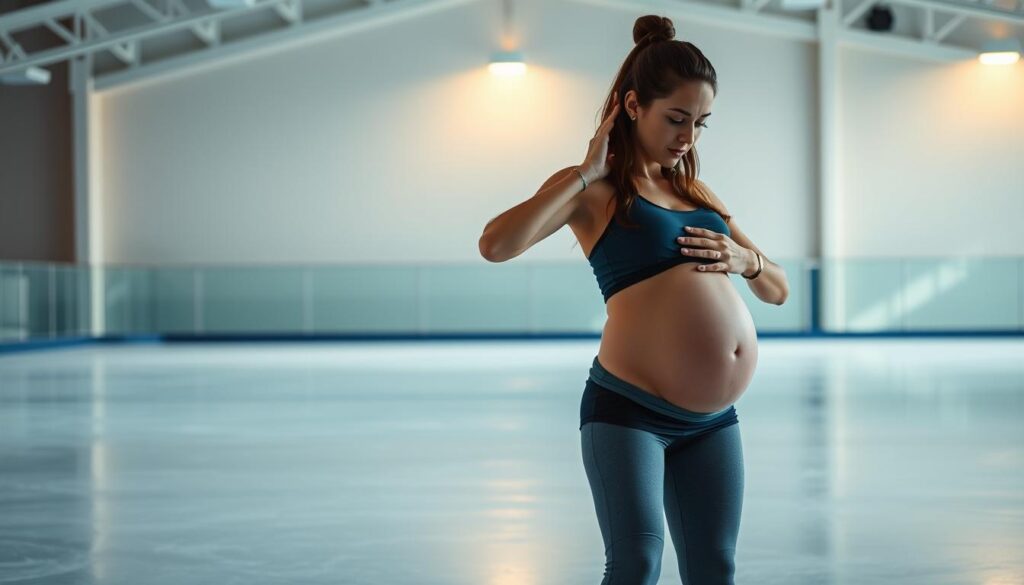
- Gentle stretching to prevent muscle stiffness
- Hydration with water or electrolyte-rich beverages
- Light protein intake to support muscle recovery
- Rest and elevation of legs to reduce swelling
Make sure your recovery is comfortable and safe. Pay attention to how your body feels. Don’t push yourself too hard.
| Recovery Element | Recommended Action | Duration |
|---|---|---|
| Stretching | Gentle lower body movements | 10-15 minutes |
| Hydration | Water or pregnancy-safe electrolyte drink | 30 minutes post-activity |
| Rest | Leg elevation and relaxation | 20-30 minutes |
Pro tip: Always consult with your healthcare provider about your specific recovery needs during pregnancy.
Remember, recovery is just as important as skating. By following these tips, you’ll help your body adjust to prenatal fitness. You’ll also enjoy the health benefits of staying active while pregnant.
Conclusion
Ice skating and pregnancy can go together with the right planning and advice. It’s key to understand how exercise affects health during pregnancy. Whether you can ice skate while pregnant depends on your health, but always get medical advice.
When you skate during pregnancy, pay close attention to your body and take safety steps. Doctors can give you advice based on your health and fitness. Every woman’s experience with skating and pregnancy is different, so personal advice is vital.
It’s important to keep your body healthy during pregnancy, whether you skate or not. Listen to your body and get expert advice on exercise. The goal is to find a balance that supports your health and the health of your baby.
If you love skating, being flexible is important. Pregnancy is a chance to find new ways to stay active and healthy. Always talk to your doctor before starting any new exercise during this time.
